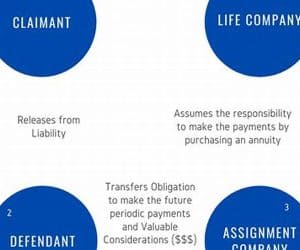What is an Insurance Structured Settlement?
When a person files an insurance claim and receives a settlement, they may have the option to receive the settlement as a lump sum or as a structured settlement. A structured settlement is a series of payments made over a period of time, rather than a one-time payment.
The term “structured settlement” is often associated with personal injury cases, such as those resulting from car accidents or medical malpractice. However, structured settlements can also be used for other types of insurance claims, such as settlements for workers’ compensation claims or property damage claims.
One of the main benefits of a structured settlement is that it provides a guaranteed income stream over a set period of time. This can be especially beneficial for individuals who may be unable to work due to their injuries or who have ongoing medical expenses. Additionally, structured settlements may have tax benefits for the recipient.
However, it is important to note that structured settlements are not right for everyone. It is important to weigh the pros and cons of a structured settlement before making a decision.
How Does an Insurance Structured Settlement Work?
When a person agrees to a structured settlement, they receive their settlement amount over a period of time, rather than as a lump sum. The length of the payment period and the amount of each payment can vary based on the settlement agreement.
The structured settlement is typically set up through an annuity, which is a financial product that provides a set amount of income over a period of time. The annuity is purchased by the insurance company and used to fund the structured settlement payments.
Structured settlements can be customized to suit the needs of the recipient. For example, the settlement can be set up to provide larger payments during periods of higher medical expenses or to provide for college tuition for a child.
Once a structured settlement is established, the recipient cannot typically change the terms of the settlement. However, there are companies that specialize in buying structured settlements. These companies purchase the right to receive the future payments in exchange for a lump sum payment. This can be an option for individuals who need cash immediately and are willing to trade the security of the structured settlement payments for a lump sum payment.
The Pros and Cons of an Insurance Structured Settlement
Pros
Guaranteed Income
One of the main benefits of a structured settlement is that it provides a guaranteed income stream over a set period of time. This can be especially beneficial for individuals who may be unable to work due to their injuries or who have ongoing medical expenses. Additionally, structured settlements may have tax benefits for the recipient.
Customizable
Structured settlements can be customized to suit the needs of the recipient. For example, the settlement can be set up to provide larger payments during periods of higher medical expenses or to provide for college tuition for a child.
Protects Against Bad Judgment or Fraud
Structured settlements can protect against bad judgment or fraud on the part of the recipient. For example, if the recipient receives a large lump sum payment, they may be more susceptible to scams or fraud. A structured settlement, on the other hand, provides a set amount of income over a period of time, which can be less tempting to scammers.
Cons
Restrictive
Once a structured settlement is established, the recipient cannot typically change the terms of the settlement. This can be a disadvantage if the recipient’s financial situation changes and they need more cash immediately.
Potential for Missed Investment Opportunities
When a person agrees to a structured settlement, they give up the right to invest the lump sum payment themselves. This means that they may miss out on potential investment opportunities that could provide a higher return than the structured settlement.
Potential for Inflation to Erode Purchasing Power
Structured settlements are typically set up with a fixed payment amount, which means that inflation can erode the purchasing power of the payments over time. This can be a disadvantage for recipients who have ongoing medical expenses or other rising costs.
How to Choose Between a Lump Sum and a Structured Settlement
When a person receives an insurance settlement, they may have the option to receive the settlement as a lump sum or as a structured settlement. There are pros and cons to both options, so it is important to weigh the options carefully before making a decision.
If the recipient needs cash immediately to pay for medical bills or other expenses, a lump sum may be the best option. However, if the recipient is concerned about their long-term financial security, a structured settlement may be a better choice.
In general, a structured settlement may be a good option if:
- The recipient has ongoing medical expenses or other long-term financial needs
- The recipient is concerned about outliving their money
- The recipient has a low tolerance for risk
On the other hand, a lump sum may be a better option if:
- The recipient needs cash immediately for expenses
- The recipient has a plan for investing the lump sum payment that could provide a higher return than the structured settlement
- The recipient is young and healthy and does not have ongoing medical expenses
How to Sell an Insurance Structured Settlement
If a person has an insurance structured settlement and needs cash immediately, they may be able to sell their structured settlement payments. There are companies that specialize in buying structured settlements, and they will typically purchase the right to receive the future payments in exchange for a lump sum payment.
Before selling a structured settlement, it is important to weigh the pros and cons carefully. While a lump sum payment can provide immediate cash, it may not be the best long-term financial decision. Additionally, there are costs associated with selling a structured settlement, including fees and interest charges.
If a person decides to sell their structured settlement, they should work with a reputable company that is licensed and bonded. They should also seek legal advice to ensure that they fully understand the terms of the sale.
Examples of Structured Settlements
Structured settlements are most commonly associated with personal injury cases, such as those resulting from car accidents or medical malpractice. However, structured settlements can also be used for:
- Workers’ compensation claims
- Product liability claims
- Property damage claims
- Wrongful death claims
- Disability claims
- Divorce settlements
In some cases, structured settlements may also be used in non-litigation contexts, such as in the settlement of certain types of lottery prizes or in the sale of businesses.
Insurance Structured Settlement Tax Implications
Structured settlements may have tax benefits for the recipient. In general, structured settlement payments are tax-free to the recipient if they are received as a result of a personal injury or illness. However, if the payments are received for other reasons, such as a property damage claim or a divorce settlement, they may be subject to taxes.
It is important to consult with a tax professional before accepting or selling a structured settlement to fully understand the tax implications.
Insurance Structured Settlement Risks
While structured settlements can provide a guaranteed income stream over a set period of time, there are also risks associated with structured settlements. One of the main risks is that the recipient may give up the right to invest the lump sum payment themselves. This means that they may miss out on potential investment opportunities that could provide a higher return than the structured settlement.
Additionally, structured settlements are typically set up with a fixed payment amount, which means that inflation can erode the purchasing power of the payments over time. This can be a disadvantage for recipients who have ongoing medical expenses or other rising costs.
Insurance Structured Settlement Alternatives
If a person is considering a structured settlement, it is important to weigh the pros and cons carefully. In some cases, a structured settlement may not be the best option. Some alternatives to structured settlements include:
- Taking a lump sum payment
- Setting up a special needs trust
- Investing the lump sum payment in a diversified portfolio
- Using the lump sum payment to purchase an annuity
Each option has its own pros and cons, so it is important to carefully weigh the options before making a decision.
Conclusion
Insurance structured settlements can provide a guaranteed income stream over a set period of time, which can be beneficial for individuals who have ongoing medical expenses or other long-term financial needs. However, structured settlements are not right for everyone, and it is important to carefully weigh the pros and cons before making a decision. Alternatives to structured settlements may also be worth considering in certain situations.
FAQs
1. How long do structured settlements last?
The length of a structured settlement can vary based on the settlement agreement. Some structured settlements may provide payments for a set number of years, while others may provide payments for the recipient’s lifetime.
2. Can I change the terms of a structured settlement?
Once a structured settlement is established, the recipient cannot typically change the terms of the settlement.
3. What are the tax implications of a structured settlement?
In general, structured settlement payments are tax-free to the recipient if they are received as a result of a personal injury or illness. However, if the payments are received for other reasons, such as a property damage claim or a divorce settlement, they may be subject to taxes.
4. Can I sell my structured settlement?
Yes, it is possible to sell a structured settlement. However, it is important to weigh the pros and cons carefully before making a decision. Additionally, there are costs associated with selling a structured settlement, including fees and interest charges.
5. Can structured settlements be used for non-litigation contexts?
Yes, structured settlements may be used in non-litigation contexts, such as in the settlement of certain types of lottery prizes or in the sale of businesses.
6. What are some alternatives to structured settlements?
Some alternatives to structured settlements include taking a lump sum payment, setting up a special needs trust, investing the lump sum payment in a diversified portfolio, or using the lump sum payment to purchase an annuity.
7. What are the risks of a structured settlement?
One of the main risks of a structured settlement is that the recipient may give up the right to invest the lump sum payment themselves. Additionally, structured settlements are typically set up with a fixed payment amount, which means that inflation can erode the purchasing power of the payments over time.
 Interogator Blog teknologi gadget canggih terbaru
Interogator Blog teknologi gadget canggih terbaru


